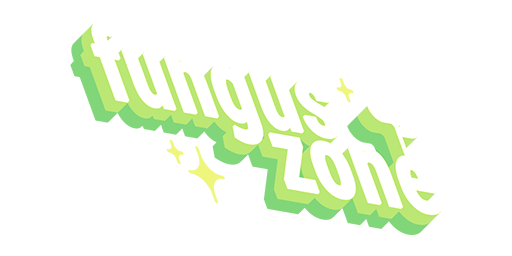My Boku no Natsuyasumi 2 Diary
- September 13 2024
- 18 min read
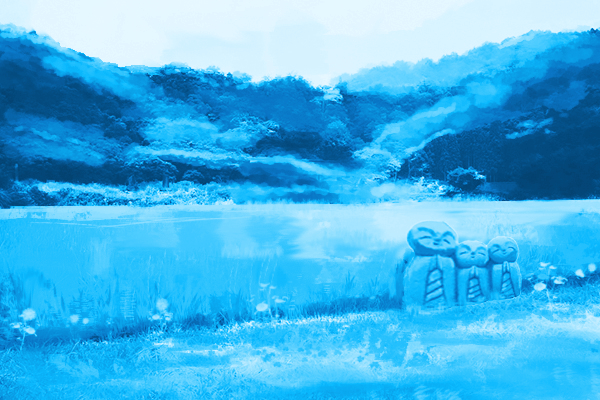
Boku no Natsuyasumi 2 is a well-regarded Playstation 2 game that finally got an English translation last November. Well, at least unofficially, thanks to the efforts of Hilltop & company.
In the game, you play as Boku, a 9 year-old city boy who’s been dropped off with his relatives in the countryside while his parents prepare for their new baby to be born. Over the whole month of August, your goal is… well, to have a nice summer. Talk to people, catch bugs and fish, explore. You know, kid stuff. With gorgeous hand-painted backgrounds and fixed camera angles, time passes whenever you cross the boundary between one screen and the next. As the month progresses, you learn more about the people around you in snippets of conversation, with some really touching emotional beats. Amazing, right?
So when Hilltop proposed playing along throughout the month of August, one day at a time, (and with a little encouragement from a friend who was playing along too) I thought, yeah. That sounds like the perfect way to experience this game.
Below you’ll find my writings and thoughts on the game as I was playing it, broken into six different parts that were written as the month progressed. Playing it at that daily pace was a real blessing, and the more I had time to sit with it and think about it, the more my appreciation for Bokunatsu 2 deepened. That pace may not be for everyone, but if you can play it that way, I highly recommend you do.
Ready to begin? Itadakimasu!
Part 1: Days 1-3
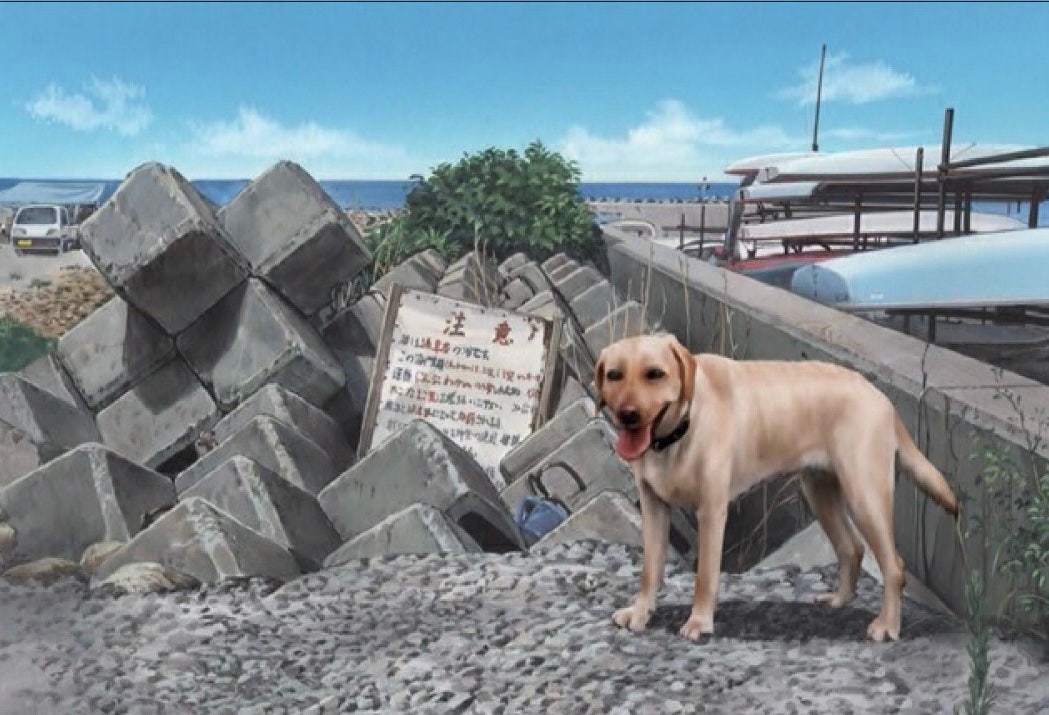
Here we go! After a short intro video to set the tone, I decided I wanted to spend the first three days figuring out what kind of kid Boku is. As the player avatar, he’s not totally void of any personality. So is he a kid that likes bugs? Fishing? Does he like sticking to a schedule or is he more carefree? What would my Boku want to do?
And then the game did something so bold that I gasped.
For the record, I had not played any of these games before, but I have watched the Tim Rogers video on Boku no Natsuyasumi 1 a couple of times and I made it about 2/3rds of the way through Em and Dia’s Bokunatsu 2 playthrough. So I already had a sense of what I’d be in for and I tried to divert my playthrough in ways that I knew branched off from what Em and Dia covered.
(Honestly, it also takes a bit of a load off for me when I know I can watch someone else do the things that I could do. It helps me stress less about getting a “good” ending.)
So as I’m playing, the dialogue is starting to give me a sense of who Boku is. He’a a city kid, yeah. Confident enough to be able to be sent away for a month on his own and to speak frankly with adults, but not too boastful or arrogant. Curious. Not afraid to speak his mind and ask questions. The kind of kid that other people feel comfortable talking to and opening up to even if it goes over his head. Oh, and this kid absolutely loves bottle caps. Did you see how his face lit up?
So Day 1, roaming around the guest house, I happened to grab some chalk by the chalkboard next to the phone under the stairs. Didn’t think much of it, kinda unsure when or how I’ll be able to use it.
Day 2, evening, I’m interacting with a lot of parts of the screen and I pass the chalkboard again, pressing the triangle button. And then a little animation and sound plays, and I think, “Oh maybe Boku will draw a little picture or write his name or—”
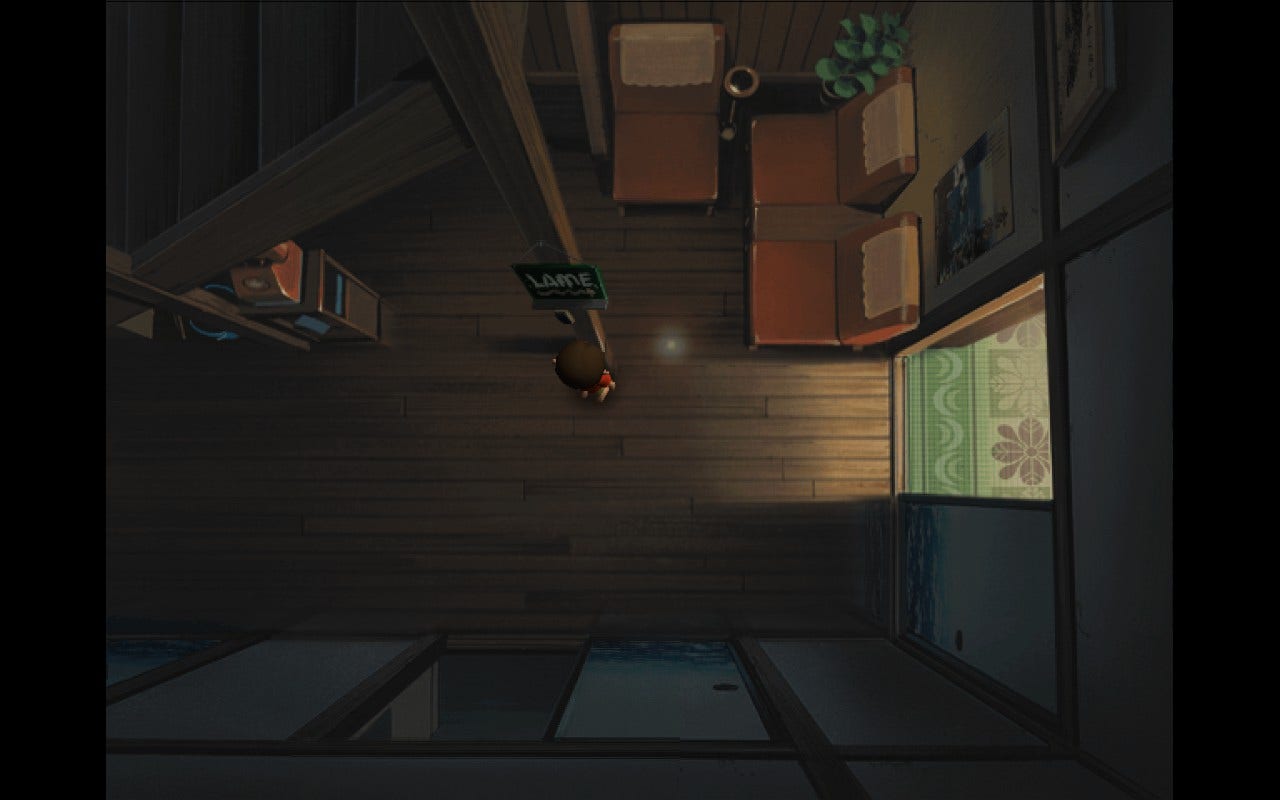
Did he… did he just…?
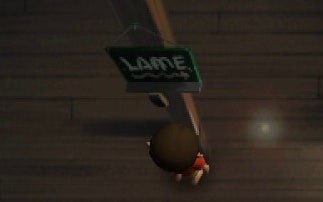
Man, I thought I knew Boku. I was wrong.
Is that… is that a little squiggly arrow pointing to the room where his two cousins live? Is this something that Boku actually believes or is this an attitude he picked up from being from the big city? And is an adult going to see that and know I wrote it? Will I get in trouble???
It legitimately shocked me. How long has he harboured those thoughts? Nothing Boku had said or done so far gave me the impression he felt this way towards his cousins. And I know Tim Rogers talks about this in his video in regards to an incident with the dog in Bokunatsu 1, where a routine interaction ended up revealing something deeper, and unexpectedly dark, about who Boku really is. I just didn’t expect it to happen on Day 2.
For a kid who’s all smiles and friendly greetings and innocent head tilts, it seems like there’s something in him that bubbles up in unexpected ways. He’s not just a blank slate, a simple avatar that players can project their own desires and agency through. In most games I’ve played, the default assumption is that the player character will never do something against the player’s wishes or expectations. They don’t tell us how they feel while we pilot them around like little mechs. It turns out Boku is a full character himself, with feelings and relationships and a history, and sometimes he can take the wheel in a way that might go against our ideas of who Boku is.
It felt like a very bold move and got me thinking: how else will Boku (and Millennium Kitchen) decide to assert Boku’s agency? Will it always be in ways that go counter to his “good boy” image? Is this something that will keep up for the rest of the month or something that will gradually soften in him over time, by being around these people in the countryside?
I have no idea, but now I’m really curious to find out.
Part 2: Days 4-7
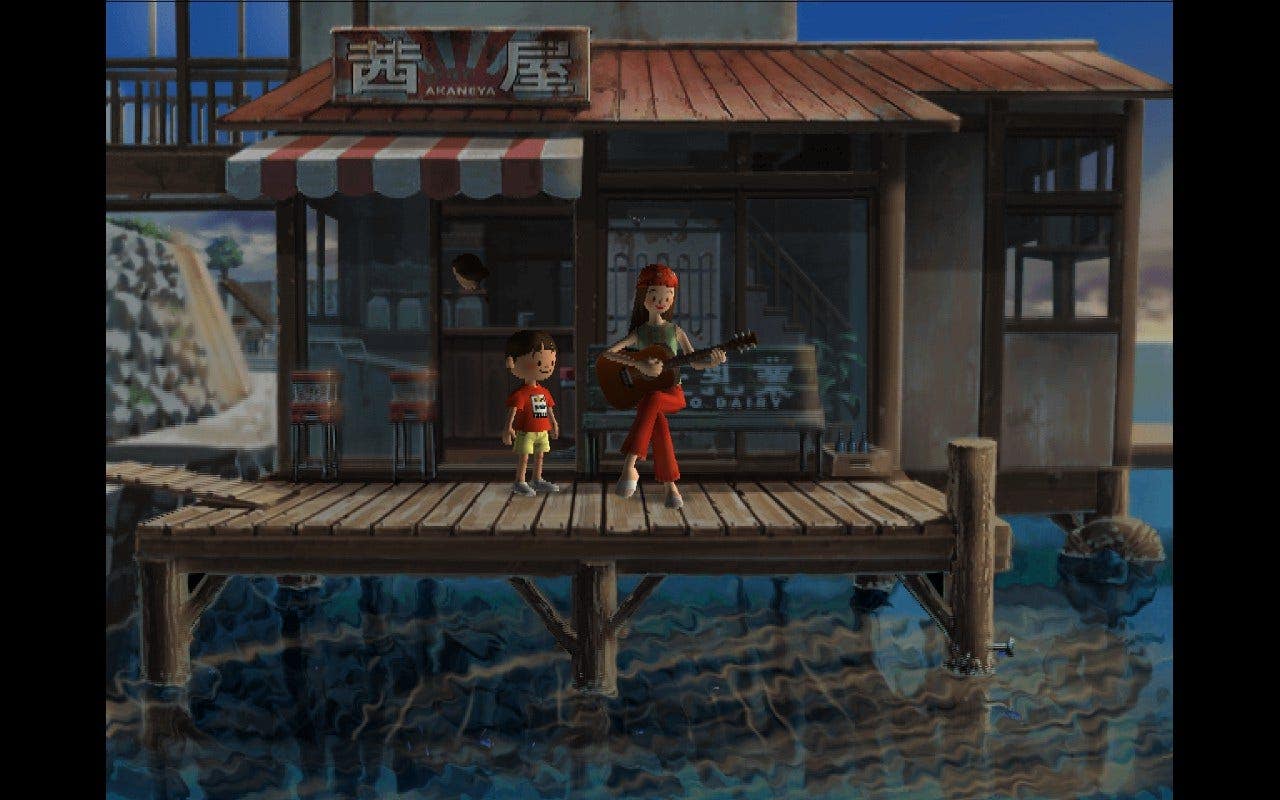
The more I play Bokunatsu 2 the more I'm appreciating opaqueness as a game quality: the ways that a game deliberately hides the numbers and counters for checks and events.
Not every game can pull this off, and it can be just as equally frustrating as it is compelling, but there's something special going on here that really works well with the game and the story they're trying to tell. Boku, as a character, is still too young to understand the conversations and relationships that the adults around him have. He has to piece it together on his own, often only catching glimpses of other characters expressing their feelings. I feel like the game expresses this through its gameplay just as well as in its story.
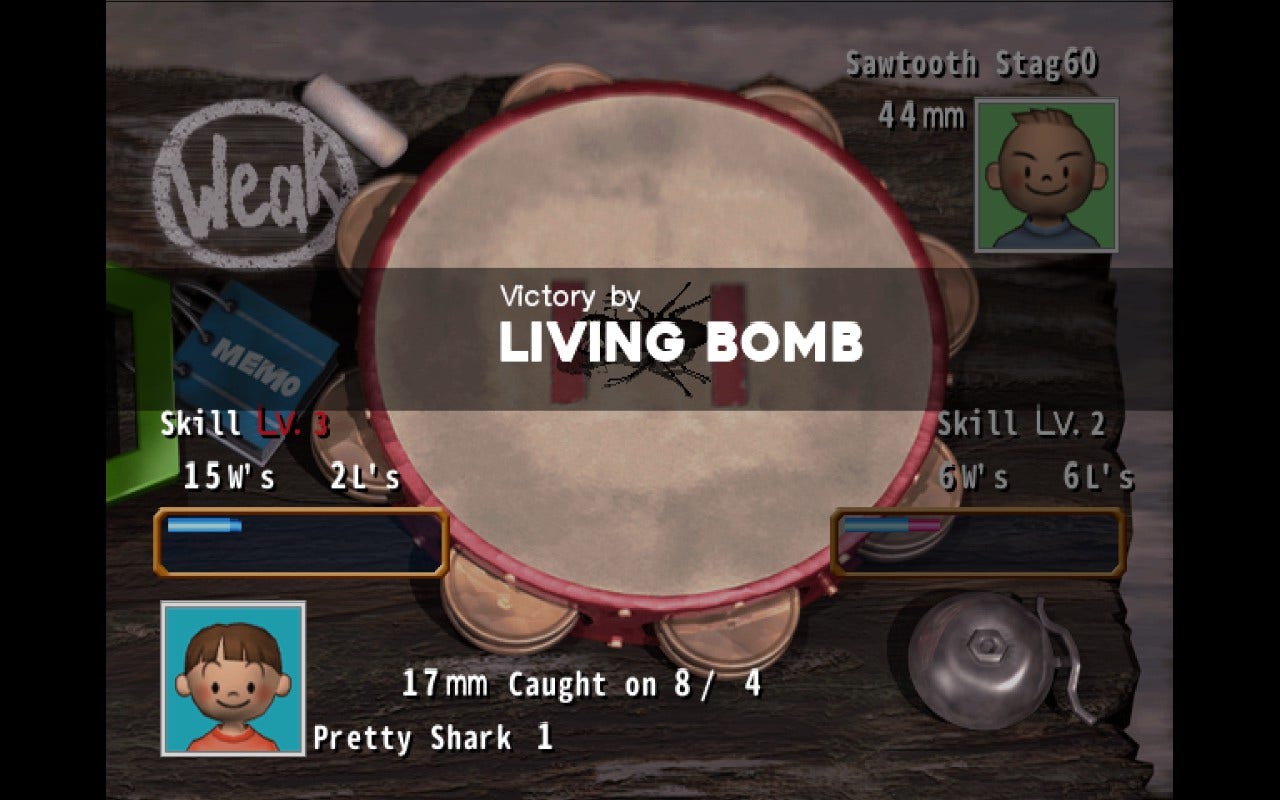
A lot of this came from me focusing on the beetle sumo minigame in my playthrough. So far, I've managaed to clear the Weak ranks a few times and made progress on Strong, but there's so much to how it works that still escapes me. How are special attacks triggered? How much should bugs be touched before a match? What factor does size play? How do the different bugs match up against each other? Do losses affect a bug's motivation or trade value?
To get through this, I feel like the process is going to be: 1) Get a bug, 2) Train the bug, 3) Trade up for better bugs, 4) Repeat until you clear all ranks. New tips will get unlocked as I face off against new bugs or hit new milestones (like when your bug gets 10 wins). Other than that? I have no idea. That's part of the fun, though.
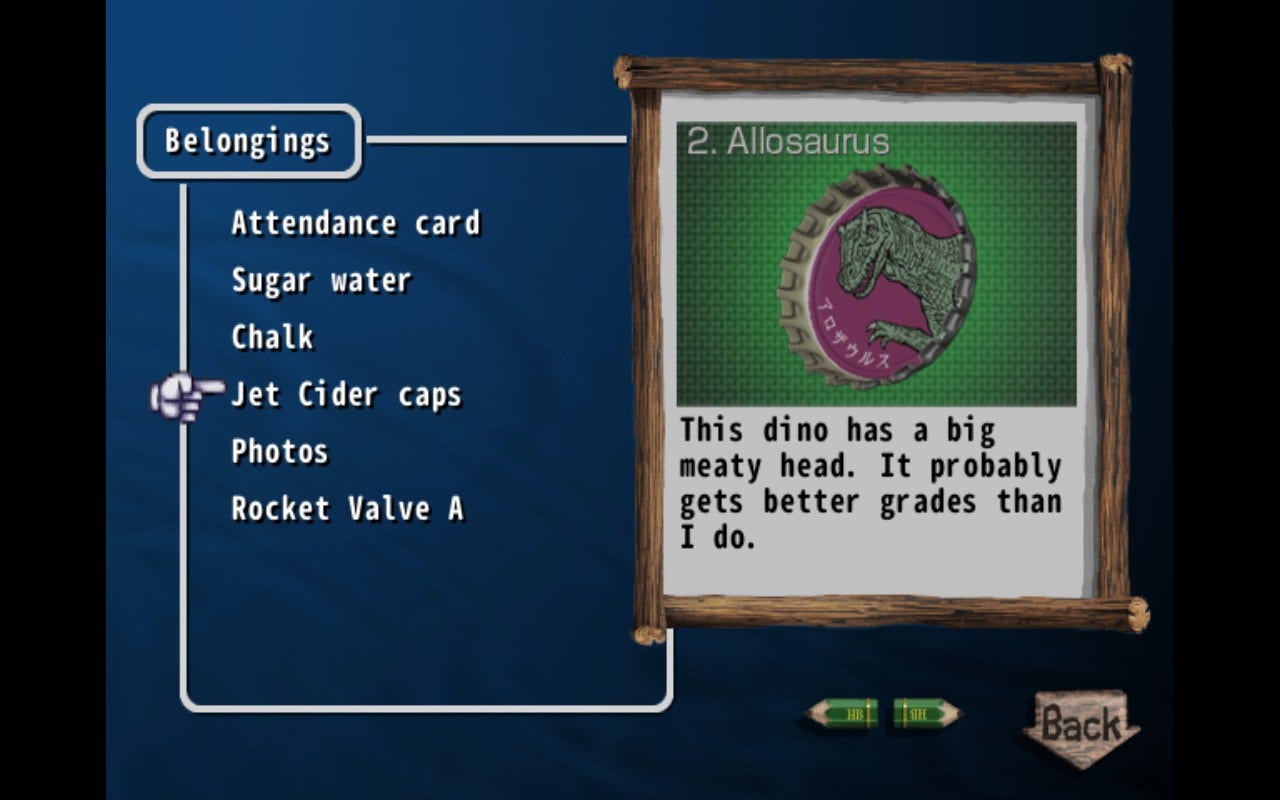
There's a board game called City of Six Moons that's meant to feel like an artifact from another civilization. Everything is written in a fictional language, even the game's manual. Part of the fun is deciphering how to play, even if you misinterpret a rule or a symbol.
There's a lot of that in Boku. The opaqueness of the game's causal relationships puts everything on an even ground, so that watering plants could potentially carry as much narrative weight as talking to your aunt. Maybe winning beetle sumo will be the defining moment of Boku's summer. Maybe it'll just lead to a new screen with a place for him to sit down. Who knows? You engage with the world around you but you have no idea what the impacts and consequences of your actions will be until you experience it for yourself. And yet, when anything can be as equally meaningful as it can be meaningless, we can still take pleasure in all of life's moments as we experience them.
And damn, if that doesn't feel like growing up...
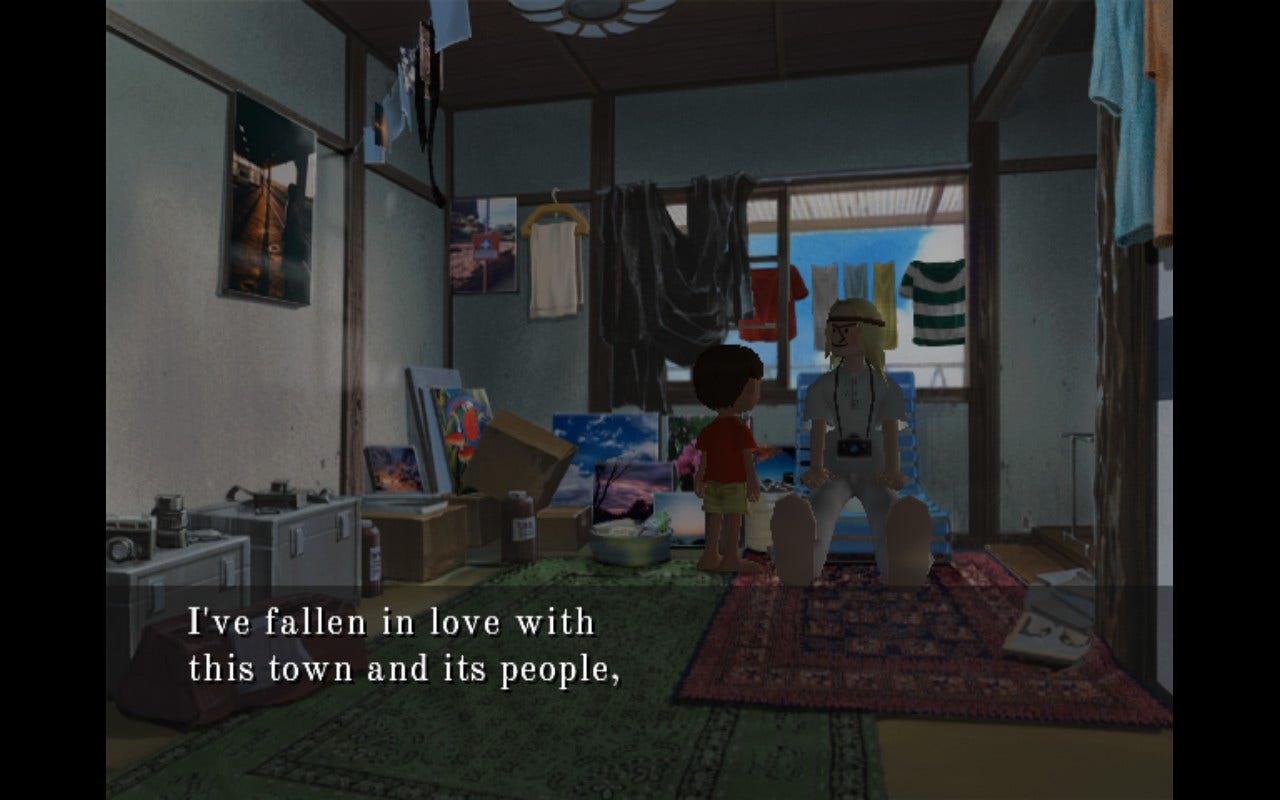
Part 3: Days 8-12
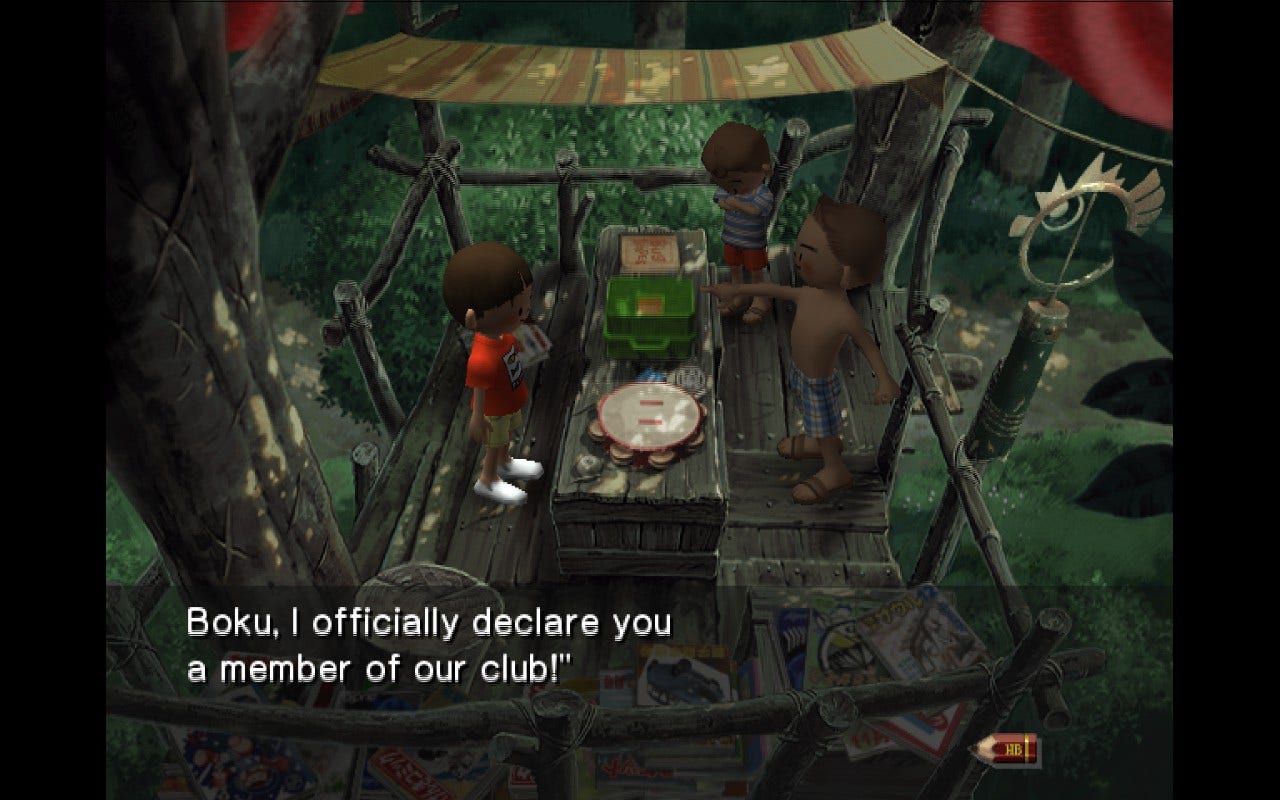
These days I was focused way more on beetle sumo. I'm starting to better understand how it all works, and it does seem like there's luck to it. I decided to use save states just for the beetle sumo because I wanted to test some theories out and see how it reacts, and I just wouldn't be able to do that as easily if I had to wait a whole day every time my bug lost a match.
So far, I can confirm:
- Bigger bugs of the same species are better than smaller bugs (especially those with the BIG tag)
- Match-ups matter. Talking to Shigeru, I get hints every now and then about which bugs face-off better against others.
- Sometimes, poking to ~50% stamina is better than poking a little bit. The longer they stay angry, the more likely they are to perform their learned skills. How much more likely? No idea. But from my save state testing it feels like there's a little increase.
- Once you make it to the Strong rank, trade for their bugs. Butterflies are super valuable, so catch them while running around to trade for beetles. By trading, you're more likely to find other species earlier, bigger bugs, and even... a jumping mantis??? Hey ref, is that even allowed?
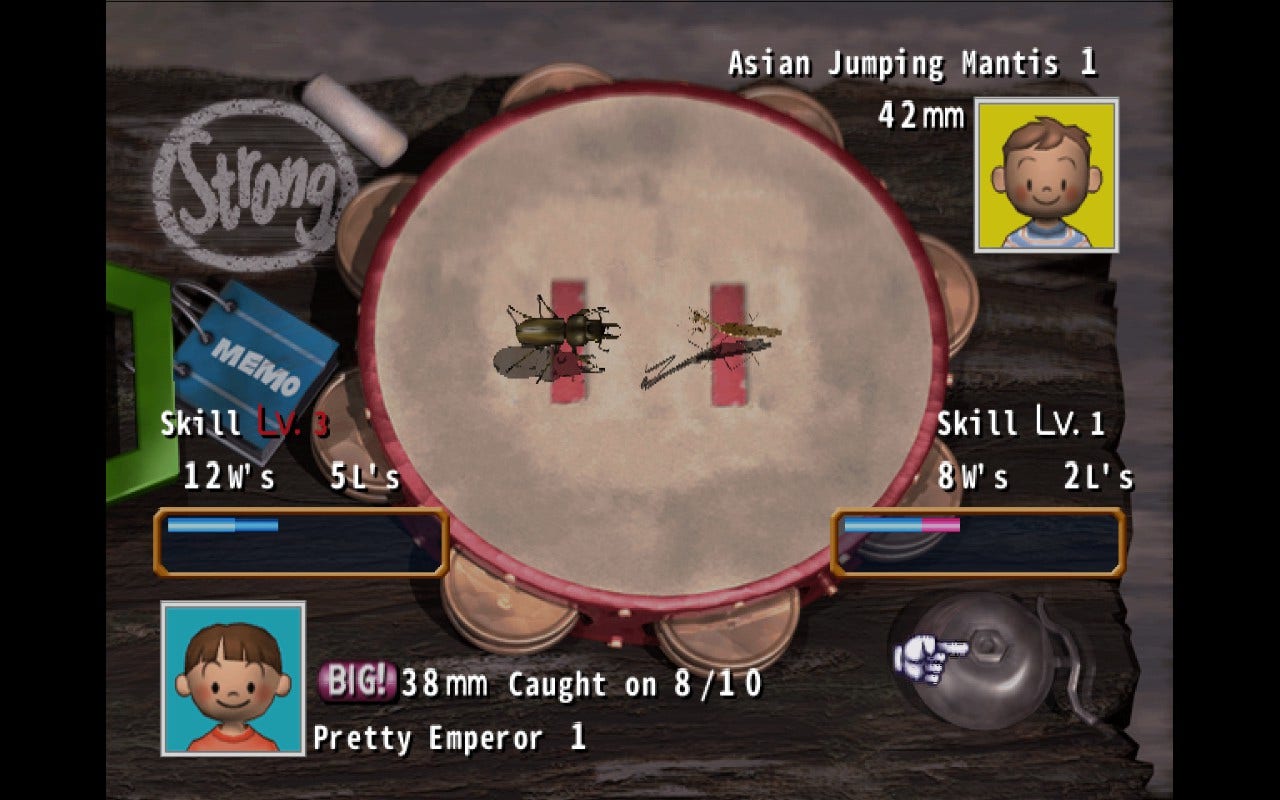
Now I need to make it through all the King rank bugs they have, but I can only face them a day at a time. I've got a high-level Big Red-Footed Stag and a Big Gold Oni that have been my go-to's, so I'm collecting the other beetles to learn more about them from Takeshi. I can still do it a little at a time thankfully, so that's chill.
Otherwise, there's still lots to love from the small interactions you have with all the characters. Boku's the kind of kid who'll stand in the middle of two adults speaking and interject with the first thought that pops into his head, no filter. So there's lots of great lines and reactions. It's very kid-like and endearing, honestly.
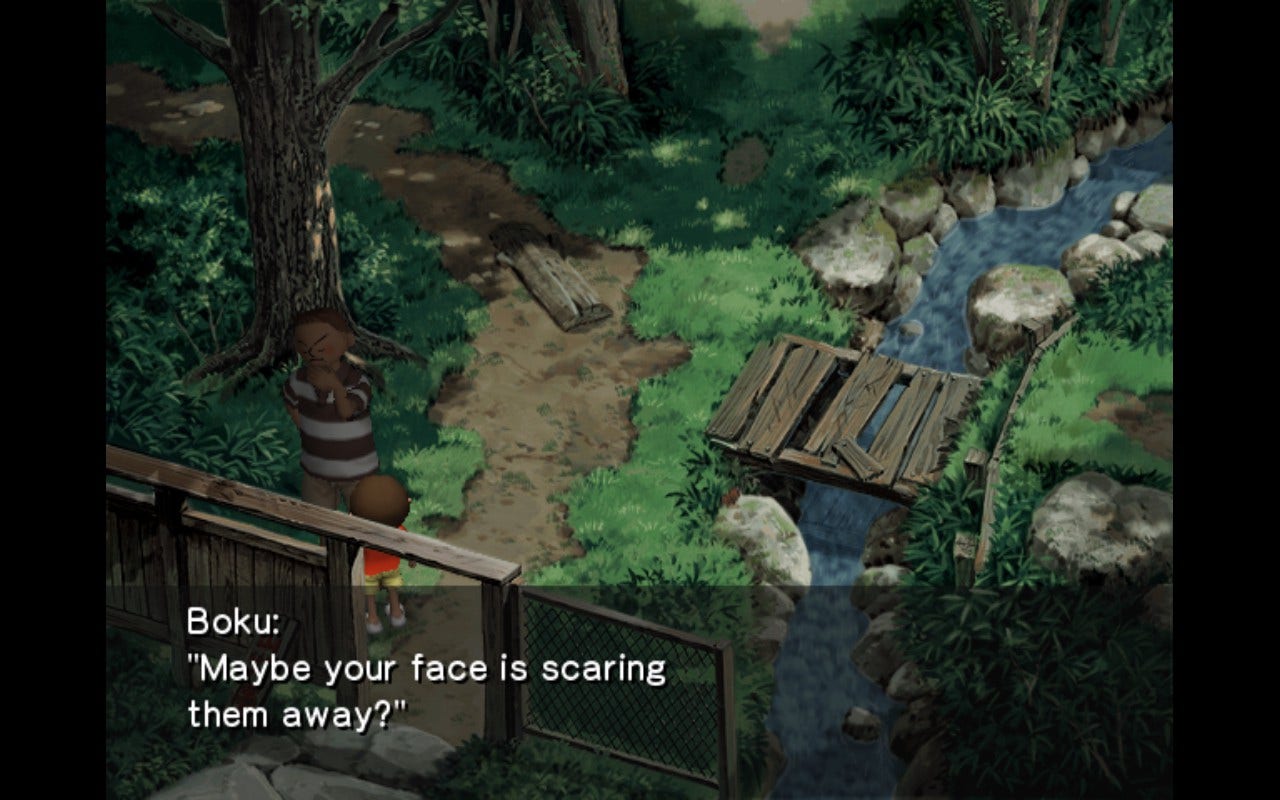
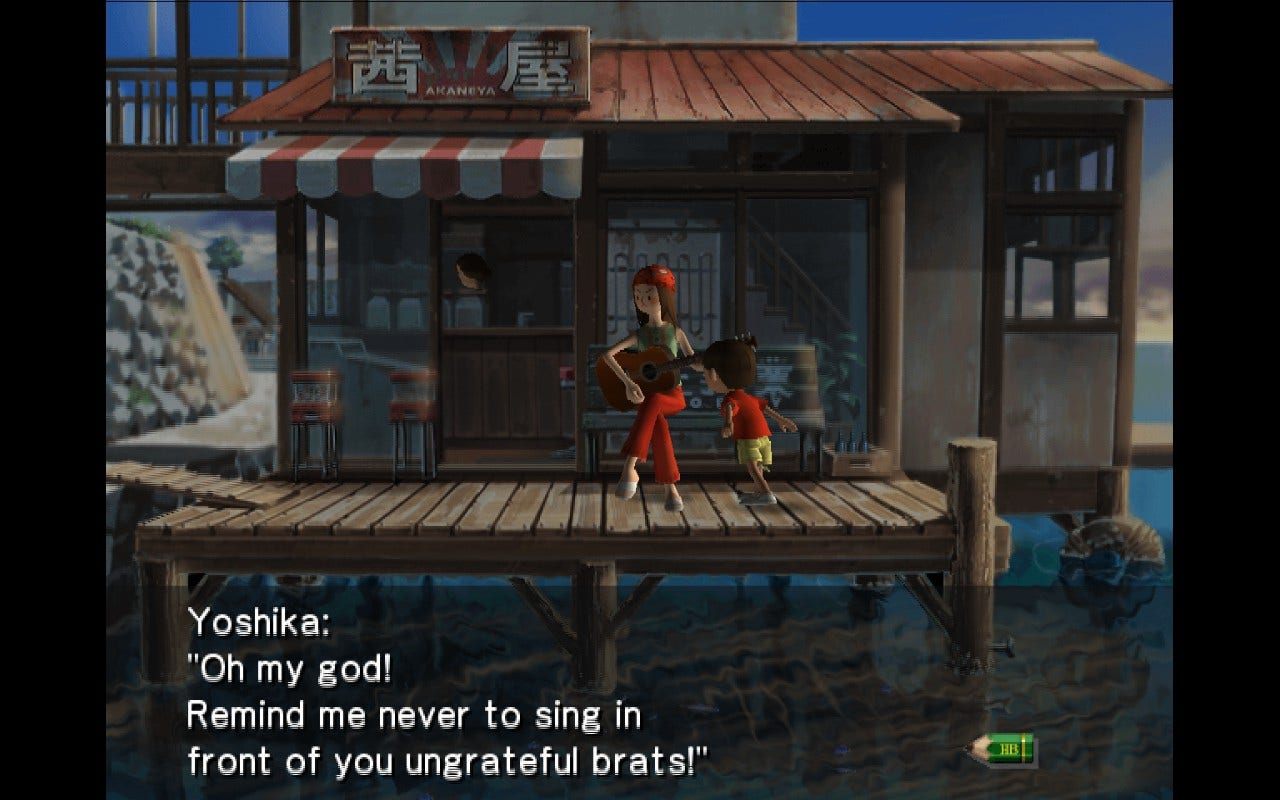
I'm also really loving the quiet moments and fun little interactable bits. You can take a bath with your cousins and they just sit with you in awkward silence. Or you can go in by yourself during the day and it's just you, in this big bath, peering over the edge. Like, the framing here is so great.
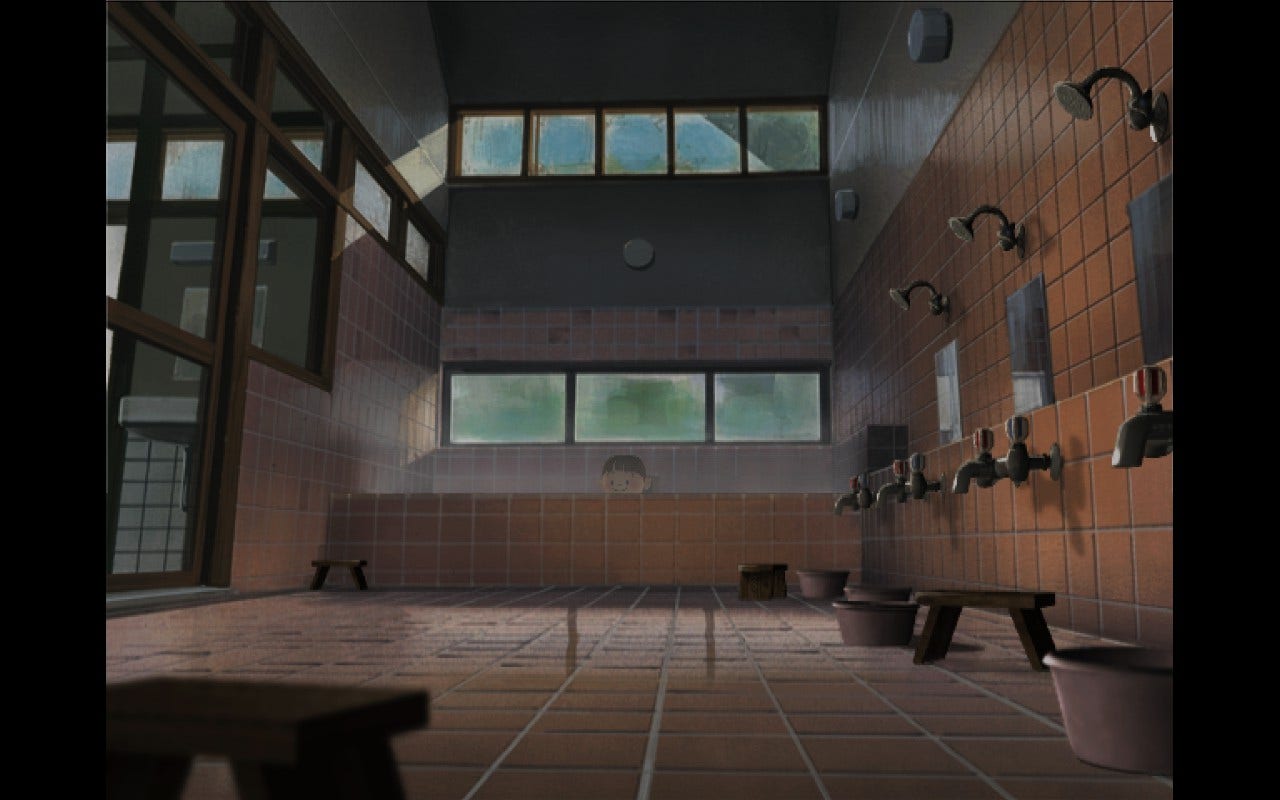
Or if you go at the end of the hall on the second floor of the guest house and look out the kitchen window, you get to see this outside shot again but with a little Boku peeking out of the upper-floor window.
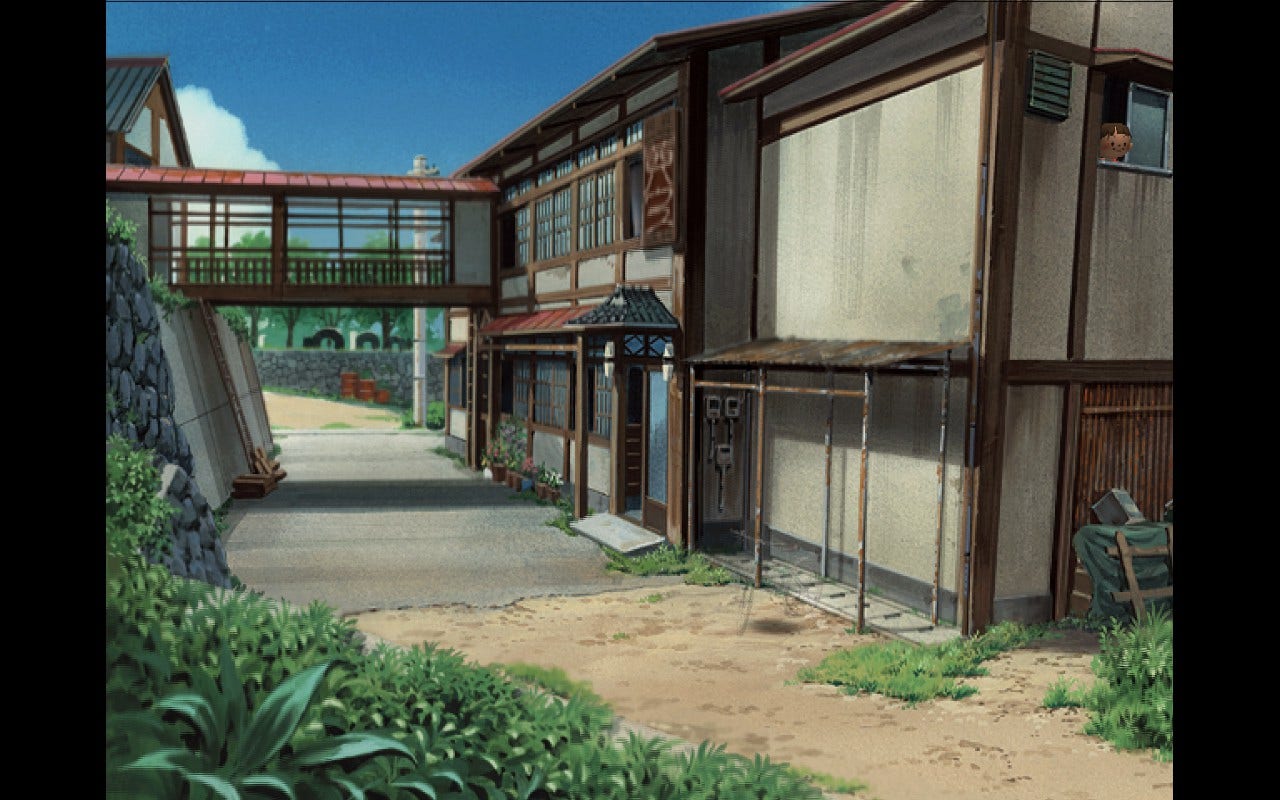
The sequencing of the camera angles here is especially perfect, running the gamut from wide to telephoto shots (figuratively speaking, it’s all still flat drawings here). And I think that's what I really love about the use of fixed camera rooms with prerendered backgrounds: they can be sequences to create little surprises, punchlines to a joke. Moving to a new room, it can feel way bigger or way smaller than you expected. Or it can lead to wonder. The path to Okusawa was blocked off for so long but you only ever saw the entrance to it from above, with a downward-tilted shot. Then as soon as you cross into it, BAM! It opens up, the camera's lower and pointed up with a wider lens to accentuate the vastness and possibility of the space you're about to enter.
There's something here that you just don't get from dynamic, constantly moving cameras in a game. And I'm charmed by the way the fixed cameras are being used for comedy or wonder as opposed to horror, like in Resident Evil. It works so well.
Part 4: Days 13-16
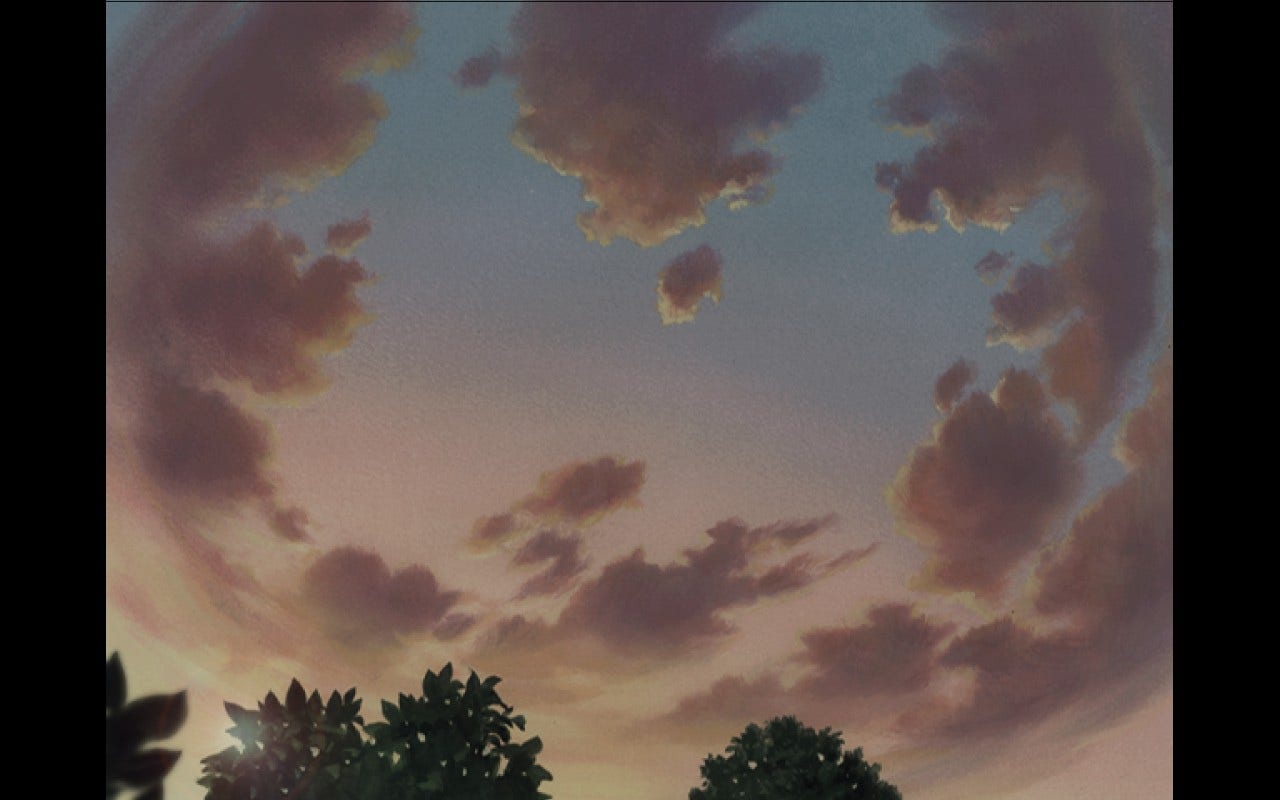
Is there a true way to play this game?
I had this thought while running around, trying to get everything done that I wanted to do today. Time moves so quickly between screens, you almost have to wonder, is it intentionally designed so that you can’t do everything you want to on Normal time mode? Who is the Quick time mode for? Are the designers aware of the irony that the Slow mode is likely the one used by players working the hardest to get the “best” ending? (If there is one…)
Why does the game compel you to do so many things, knowing you have so little time to do them?
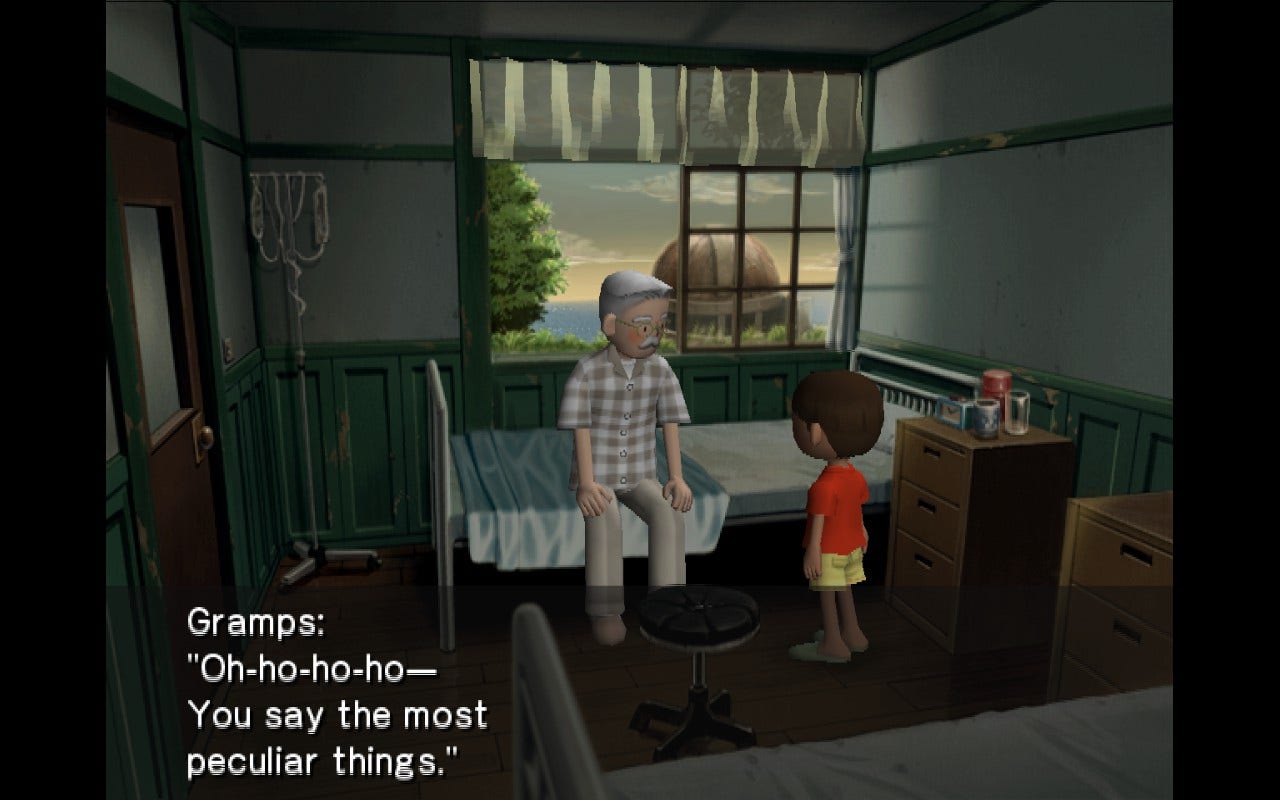
The game lets you know the deal from the jump: you have 31 days to have an unforgettable summer vacation. You have a diary that needs an entry every day. You have a counter on the menu telling you how much yen you have and how many of the 25 bottle caps you’ve collected. You have a book with your insect collecting kit that has room for 101 entries. There’s an untold number of fish to catch. Of bugs to wrestle. Character interactions. You can give massages. You can guess what you’re having for dinner. You can tan.
The pro Bokunatsu 2 player pays attention to paths. They need to know the quickest way from point A to point B to maximize their time. How many screens will I need to cross? How much time do I have left? Is it faster to take the south path around or the east path through? Can I afford to check this area for an event knowing it could cost me 3 screens’ worth of time if it leads to nothing? What do you do?
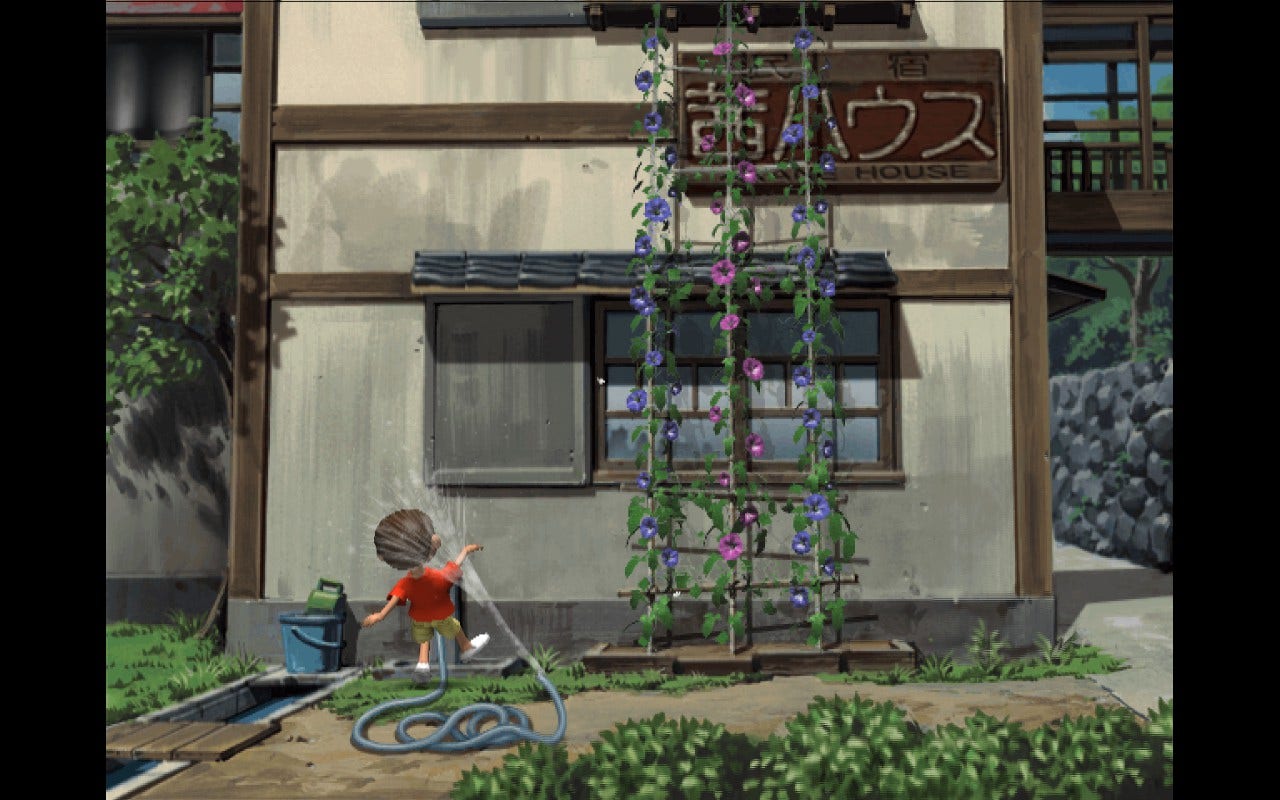
It’s an interesting push-pull. The game is enticing you with so much, dangling these options in front of you, teasingly. Players want to see as much of the game as they can, hoping they come out of their playthrough with an experience they can remember fondly. Don’t you want to make the most out of your vacation, kid?
Assuming that Normal time is the mode that the developers see as the intended experience, Boku (and the players, by extension) need to make decisions about what they can and can’t do in a given day. It’s made deliberately tight, not by much, but just enough to force you to choose, knowing you can’t realistically do everything you want to do. You have to learn the game’s pace. You, like Boku, start to grow familiar with the pace of life and your ways around.
And it’s clever how the game progresses. The further into the month you get, the more areas get unlocked, which means you have to travel more and more, severely reducing what you can do in a given day. Time is the most crucial resource in the game and there’s no way to reverse its flow. There is no way you’ll be able to do everything without putting in an absurd amount of work that feels antithetical to what this game is about.
A part of me wonders if the developers do this intentionally to teach you to let go of perfection. Or if they put in more to entice you to keep playing, to get a better ending. My gut’s telling me the former, and that it encourages you to replay it, not in the hopes of getting the “best” ending, but in seeing as much of its different parts as you can. Maybe you want to do a Quick run and just fish? Or maybe you want a Slow run to do a couple of more things to round out your last playthrough? They account for players who try to do everything, but for now, I don’t believe the “best” ending is the true one.
The game wants you to have a memorable experience playing it, and is trying to tell you that you can, even on days where… nothing really interesting happens.
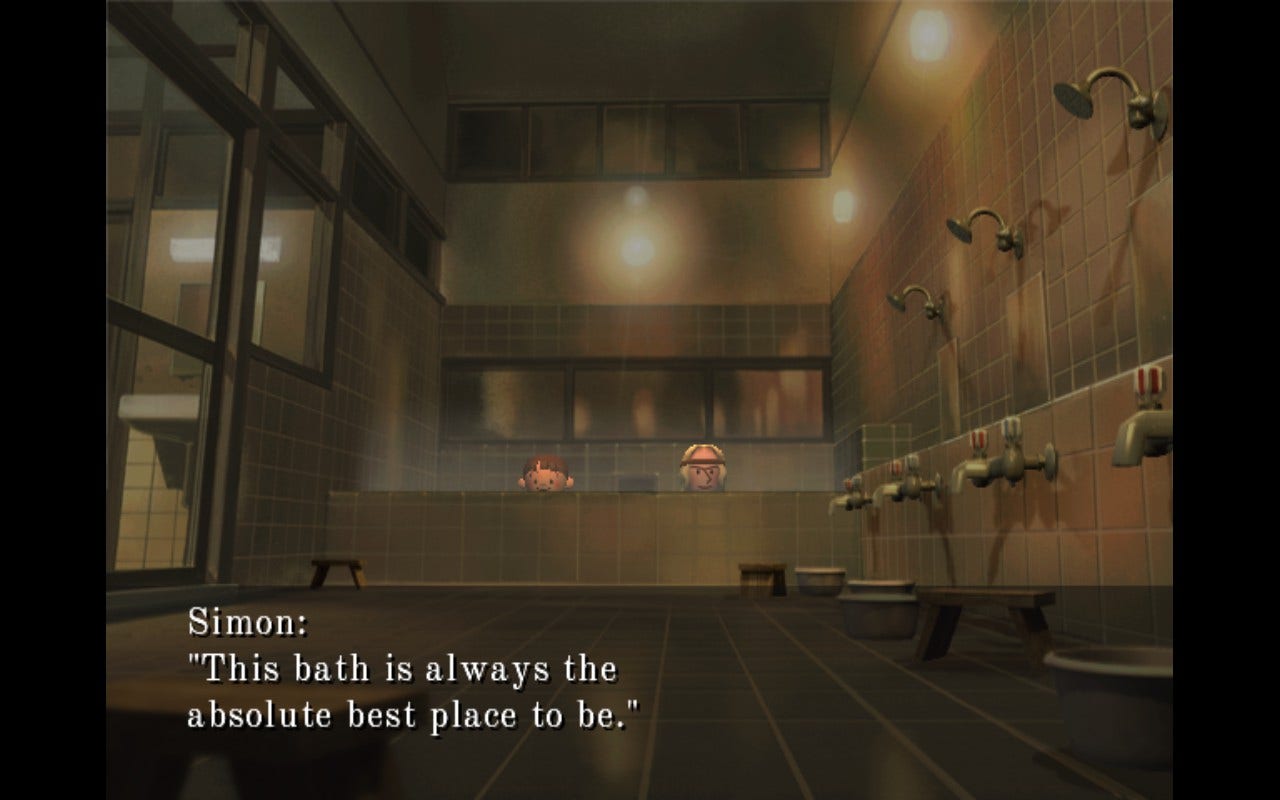
Part 5: Days 16-26
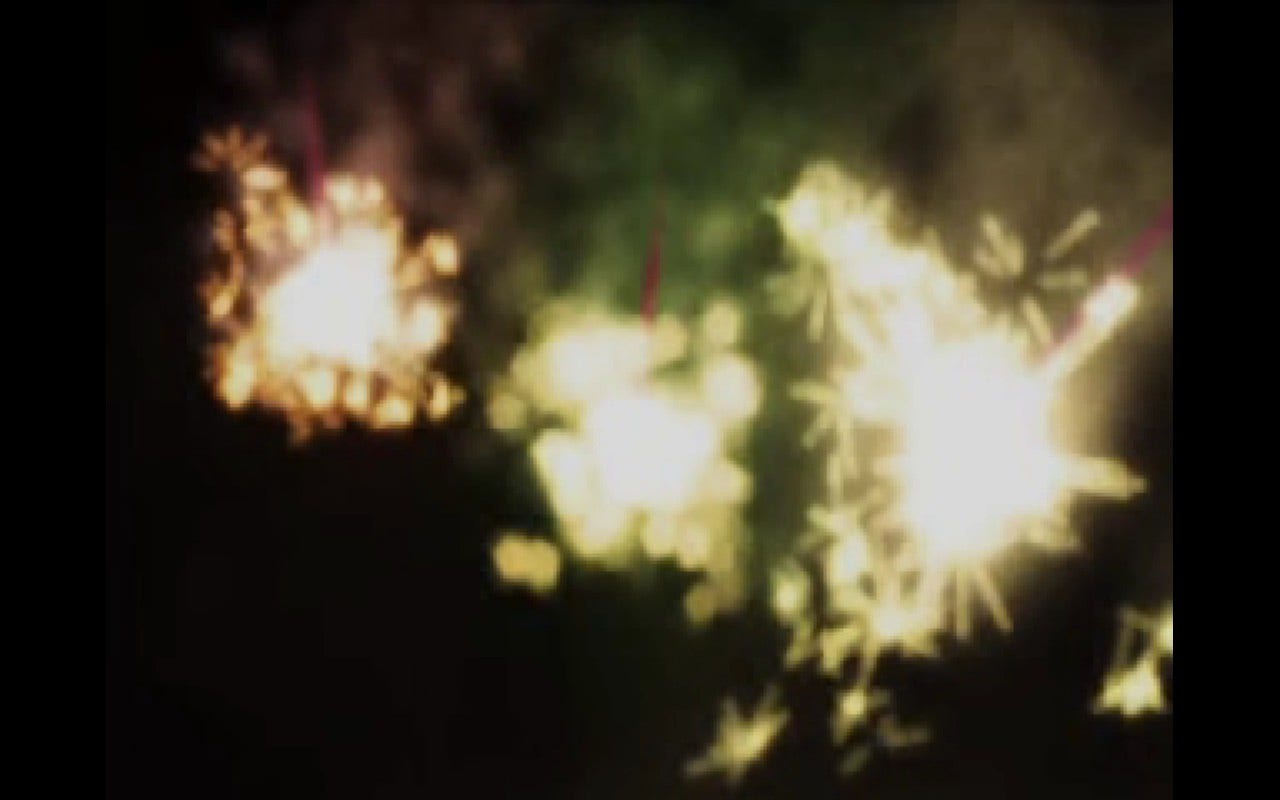
Summer’s almost over.
It’s a bittersweet moment to grapple with. For me, it’s usually when I reconcile all the hopes and plans I made at the outset of the season. How was my summer? Did I get to do most of the stuff I wanted to do? What did I miss out on? Maybe next year, I say.
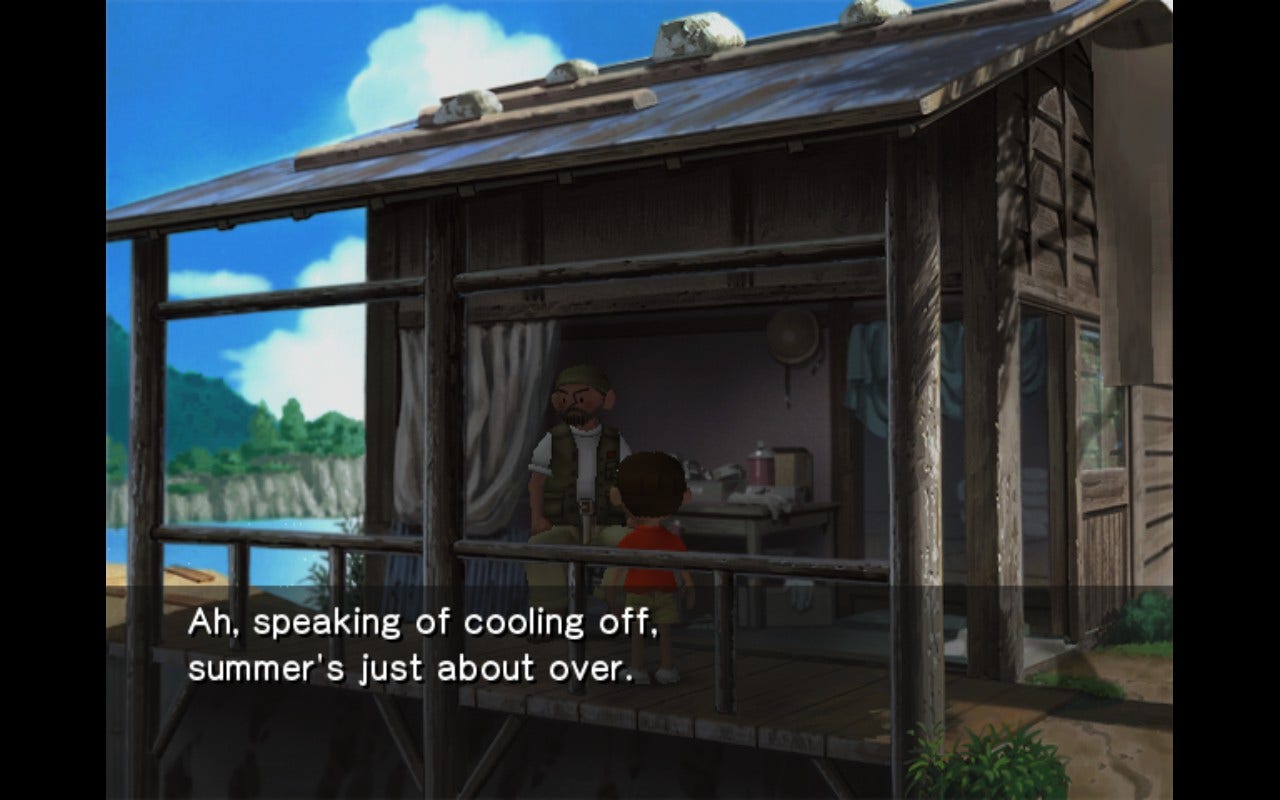
All throughout the month, I’m happy that I’ve been able to keep up playing Bokunatsu 2 nearly every day. It’s been a gift, playing a game that lets me check in for a bit, do my rounds, and then stops. Unlike Animal Crossing, where you can keep running around all day tending to your town, the days in Bokunatsu 2 eventually come to an end. Characters don’t have anything else to say. There’s nothing left to do. I appreciate that.
So what’s happened so far?
Spoilers ahead for events and storylines in the game. If you’d rather experience it for yourself, feel free to ignore this. But if you’re curious, feel free to read on!
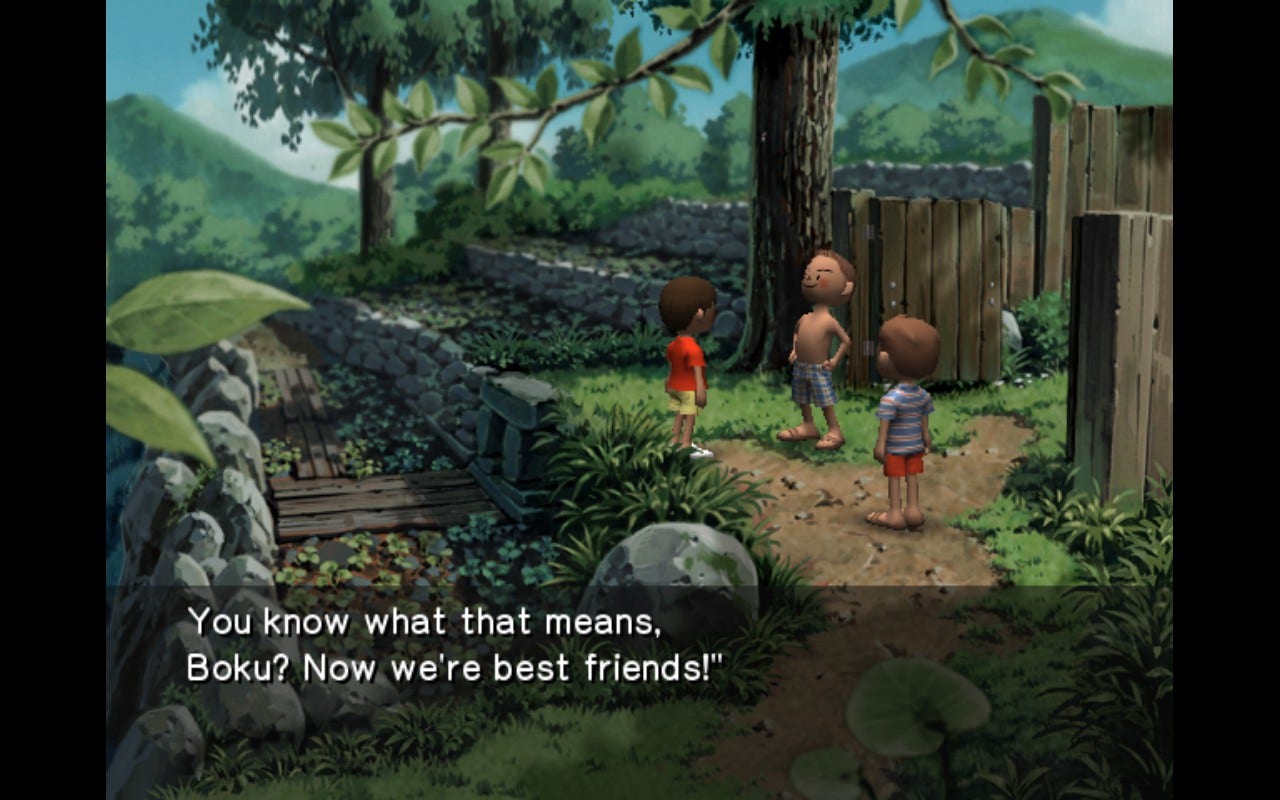
All in all, it’s been an eventful month for Boku. From my first entry, I wasn’t able to gleam much more about who he is outside of a player avatar. The sparse moments where a bit of personality pop through are more there to remind you that he’s a kid. He intrudes and pesters (not with any ill will, mind you) because that’s just what kids do when they’re stuck in environments with lots of adults. It’s a nice bit of authenticity, the innocence and naïveté, even when you think, “Well surely you could figure this one out, Boku!”
But nope. He does his signature “pivot to the camera and head tilt” whenever there’s a major reveal. As if he’s unsure how to react and he’s looking to us for guidance. “Huh? What do you think she meant by that?” he seems to ask.
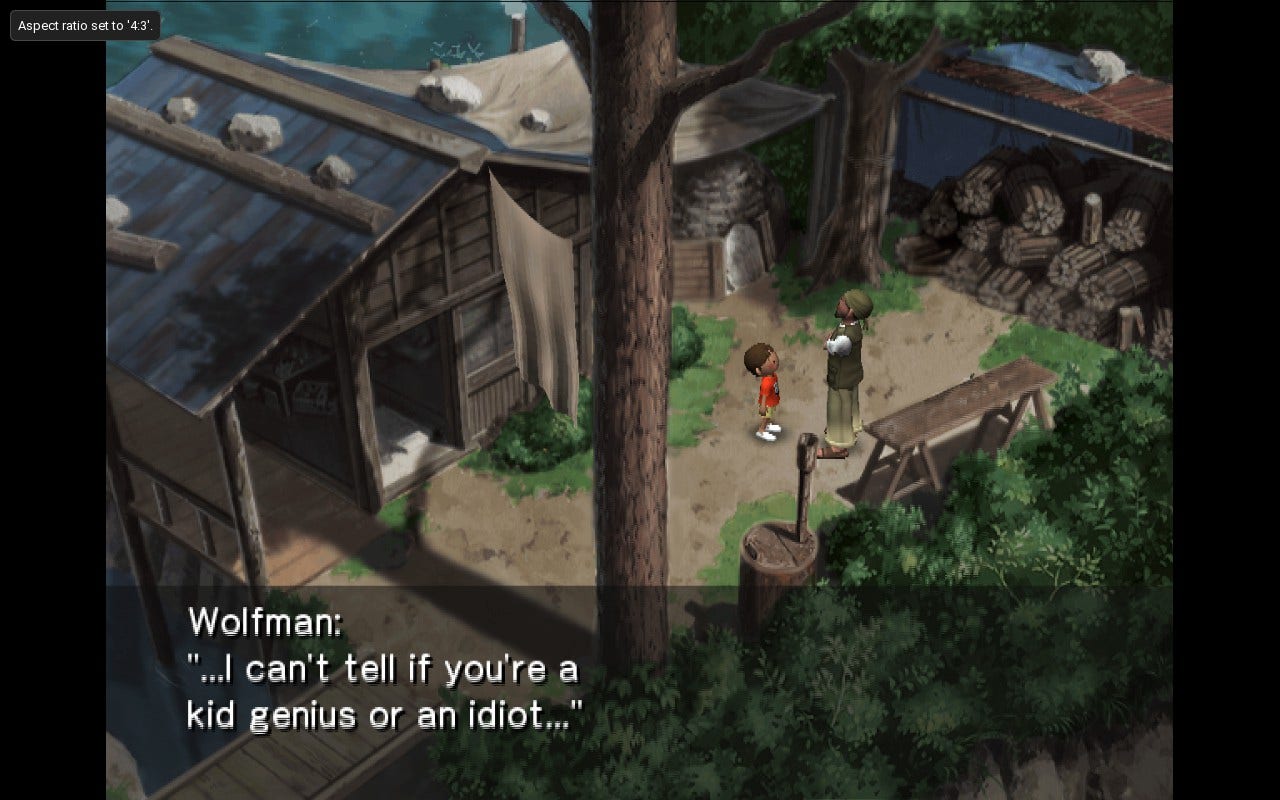
Now, like I said, I had already watched through nearly 2/3rds of Dia and Em’s playthrough of the game before starting it myself, so I knew the Yoh x Yasuko, Ghost Wife, Estranged Mom, and Yoshika Undercover stories were coming. Those seem to be the major narrative beats in the game. And from what I can tell so far, the last one feels like the biggest of them all. In fact, it’s interesting to see the ways they breadcrumb it all the way through.
When you first meet Yoshika, she’s a little unclear on who she is and where she comes from, even telling something contradictory to Simon. If you talk to him enough, you get a sense that he knows something is off with Yoshika too. He sees it in her eyes and often playfully teases her in the evenings about it. She has the newspapers in her room with the robbery story, there’s talk about it during mealtime one day, and Yoshika often talks about waiting for something or someone to appear (cue Boku in his confused thinking pose). It’s nice to see so much narrative design space in the game being used purposefully, building up towards something instead of merely providing flavour.
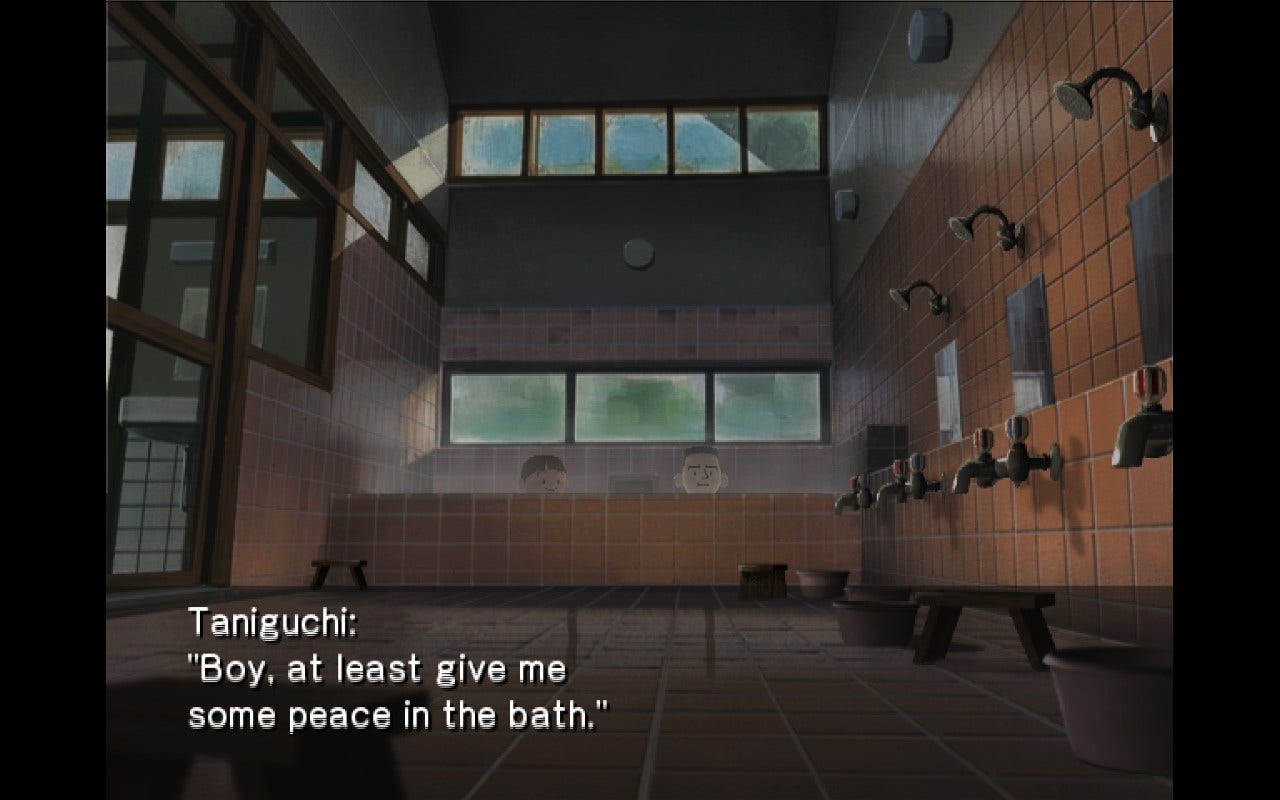
I’m still unsure how this beat is going to end or what impact these events will have in Boku’s life. It’s definitely meant to be the most exciting, action-packed event to happen on this little island in a while.
(I was talking to a friend of mine about it as they play through the game too, and we’re just hoping he doesn’t end up becoming a cop at the end of the game. Like… please, Boku. My son. You could do so much better.)
My favourite beat so far though is Hikari and Yasuko’s mom, Shizue, visiting. She’s a really interesting character in her own right, as a parent who set out on a career to help other kids even when she recognizes the irony that she messed up with her own and can’t reconcile things. Everything else in this game feels like YA drama, but this is something that feels comparatively adult. How do you manage the pull you feel to return to a place that’s not totally welcoming, or one that stirs up bad memories in the process? What do you do when you recognize that you’re not cut out for raising kids? Will your kids ever be able to understand you or forgive you? Should they? Her departure from the island is quiet and bittersweet, and I wonder if there was anything else I could have done to help. Or maybe that’s something even a simple Boku can’t fix.
I’ll do one last wrap-up post at the end of the month. Regardless of what happens next, more than finding a lunchbox full of gold bars, beating Takeshi’s ”ultimate weapon” in beetle sumo, or giving a ghost a massage, it’ll be Shizue’s visit and conflict that will stay with me long after this game (and this month) is over.
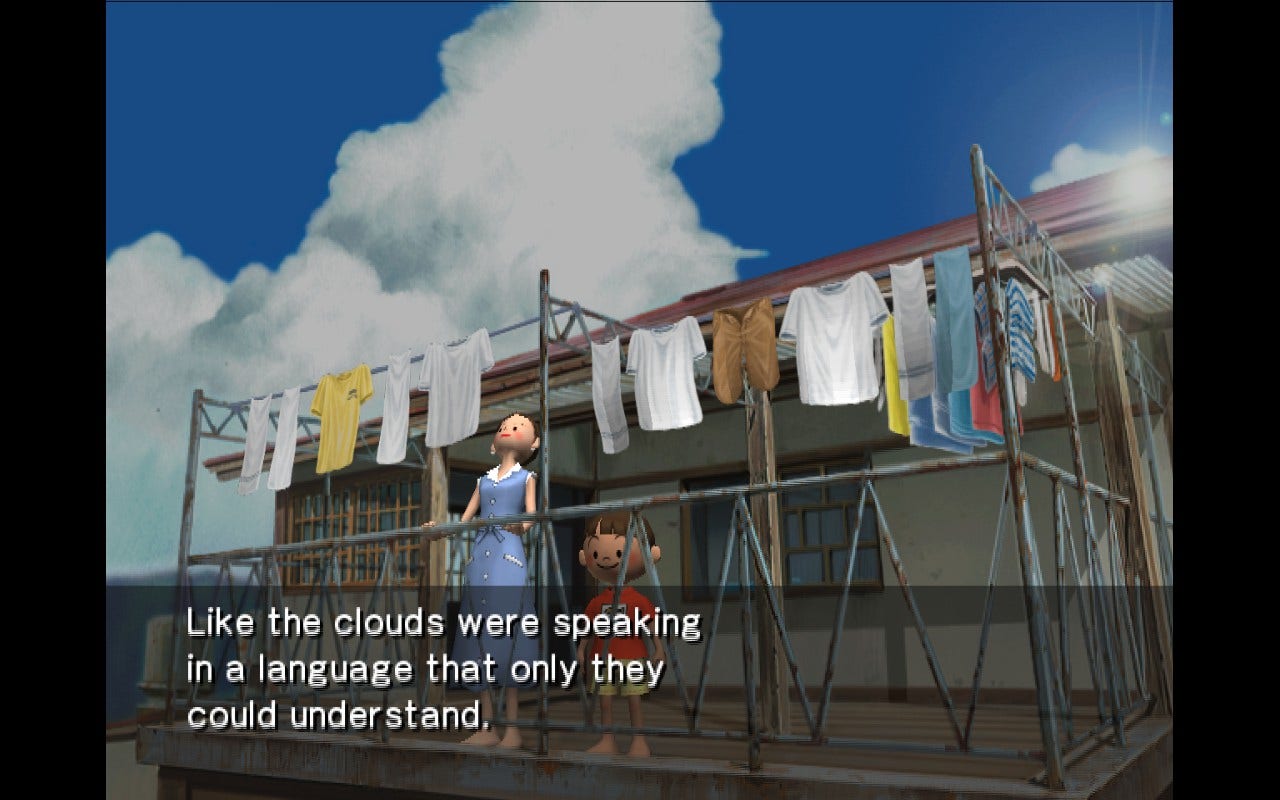
Part 6: Days 27-31
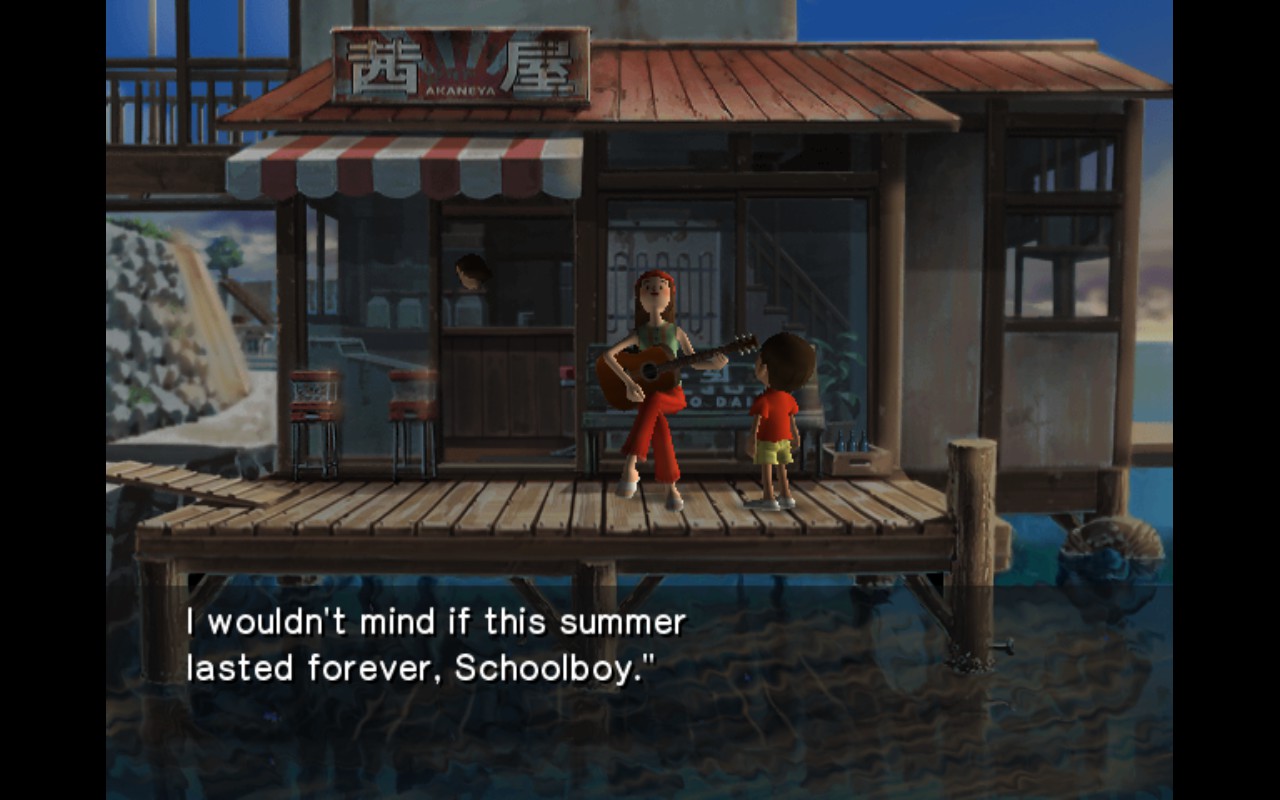
Patient and trusting.
That’s what I would say if someone asked me to describe Boku no Natsuyasumi 2. There’s a confidence in its design’s opaqueness where the game knows exactly what you, as player-Boku, need to know and what it should deliberately withhold at all times. And often that can be whole game mechanics (such as tanning) or story beats (as characters appear at certain times and places for dialogue flags). No matter how your month progresses, there’s a gentle guidance in Haruki’s origami fortune teller and the variable clock speed. ”Take your time,” Boku no Natsuyasumi 2 seems to tell us, “Que séra, séra.”
After giving it more thought, Boku no Natsuyasumi 2’s game-player relationship isn’t that dissimilar to a parent-child relationship. A very gentle, patient parent. And that’s kind of… beautiful.
While my partner and I raise our kid, it’s been a constant whirlwind of learning, observing, and adapting. Ideally, we can leave our daughter with enough space and freedom to explore on her own and develop her independence. At the same time, she’s still young and vulnerable, and it’s crucial that we are there to guide her, provide support, and course-correct if necessary. Maintaining a balance of both is the crux of parenting. Too much of the latter and she may grow over-reliant on our guidance and approval. Too much of the former and she may feel neglected and unsupported. And all the while, to convey trust in her and her abilities before we step in to help.
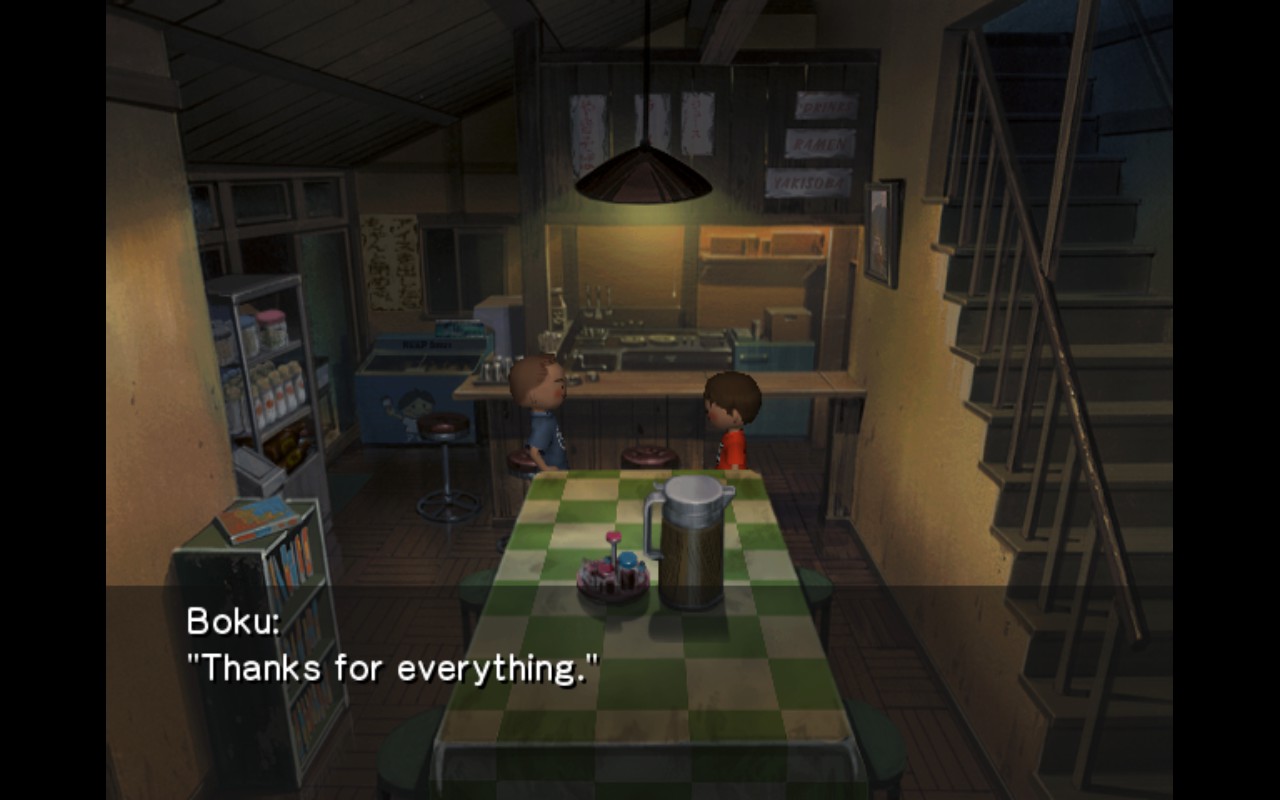
The same is true for games and players, and Boku no Natsuyasumi 2 feels like it’s aware of this relationship intimately. That awareness is shown in the ways that the world is designed around Boku and the things he can and can’t do, what he is and is not aware of, as well as the ways that the players themselves interact with the game. It feels like the game wordlessly transports us to a playground and lets us explore a space while the designers stand aside. They know to step in only when absolutely necessary, and it’s lovely to feel trusted enough to be able to learn things for ourselves, even when we may not fully understand the reasons why things work the way they do. It almost makes me wonder how many members of the team were parents of young children during the game’s development.
Honestly, I wish more games were designed with that kind of healthy parent-child relationship in mind. To model the kind of trust, love, and respect, to not look down on you or to hold your hand through it all. Like a good parent, it knows to give you space enough to run while keeping themself at a respectful distance, and it knows exactly when to step in for that brief word of support. And that’s about the highest compliment I can give to the game.
Thank you, truly, for an unforgettable summer, Boku no Natsuyasumi 2. Gochisousama-deshita!
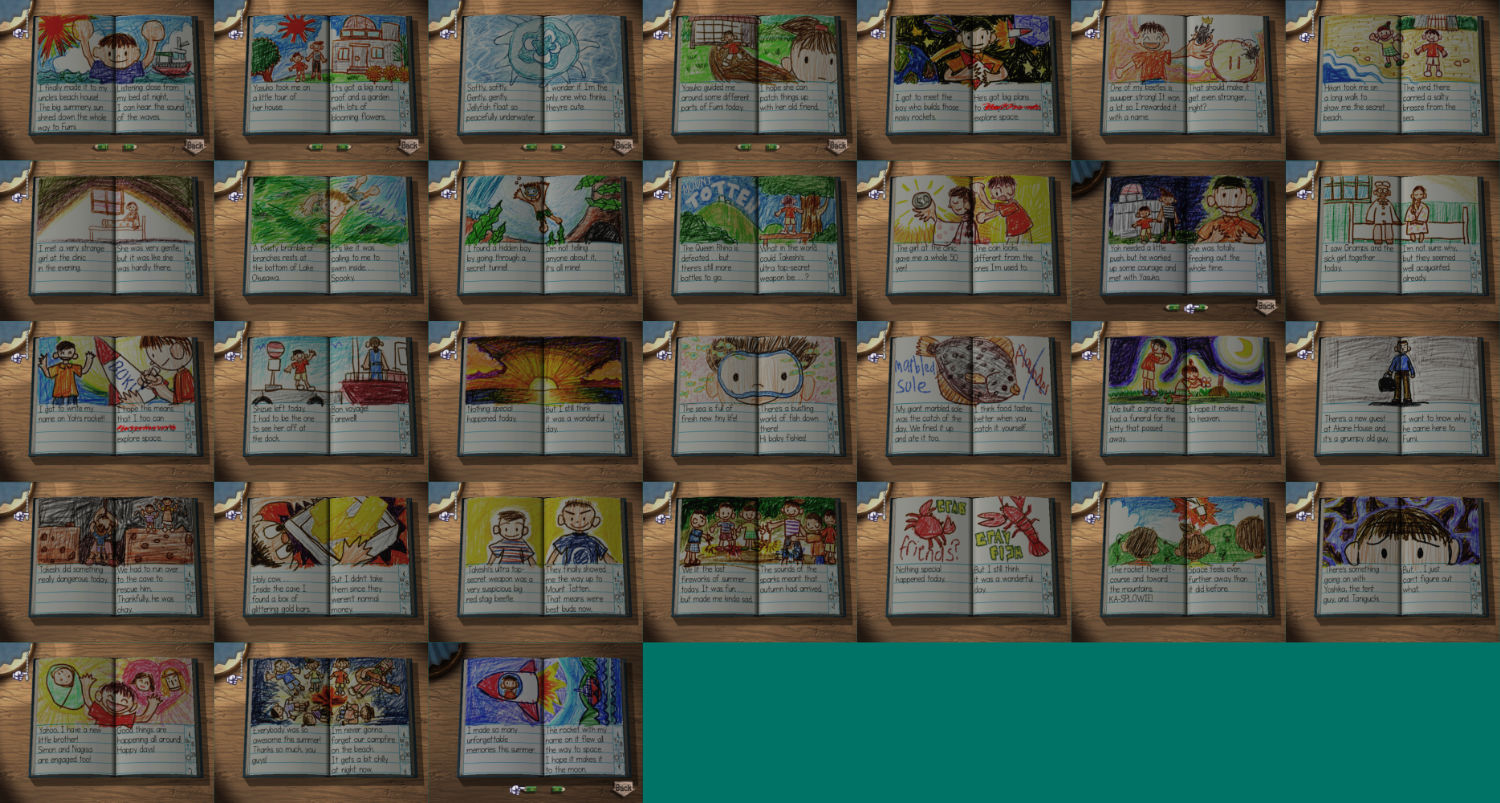
Final collage, showing all the diary entries from my month playing Boku no Natsuyasumi 2
